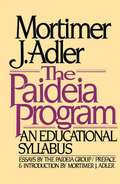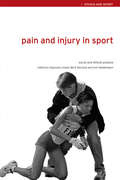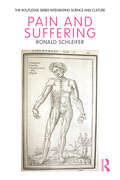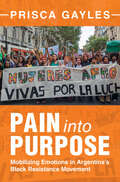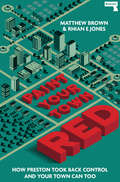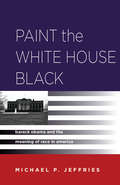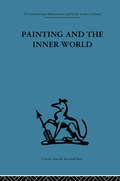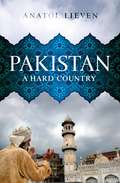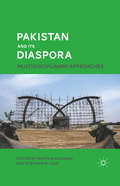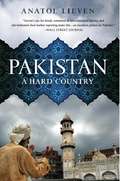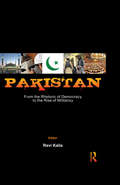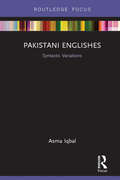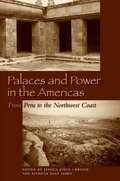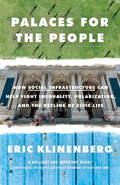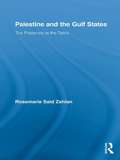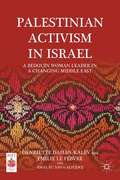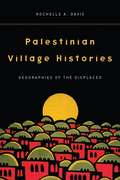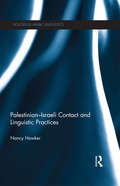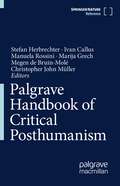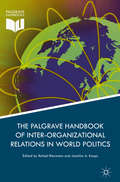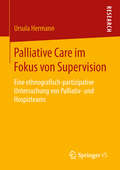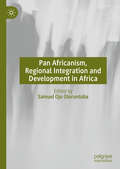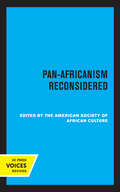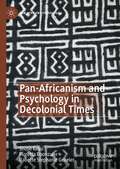- Table View
- List View
Paideia Program: An Educational Syllabus
by Mortimer J. AdlerPaideia is a holistic approach to life-long learning with roots in ancient Greece.The Paideia Program is based on the belief that the human species is defined by its capacity and desire for learning. The program itself argues for a public education that is at once more rigorous and more accessible.
Pain and Injury in Sport: Social and Ethical Analysis (Ethics and Sport)
by Ivan Waddington Sigmund Loland Berit SkirstadFor elite athletes, pain and injury are normal. In a challenge to the orthodox medical model, this book makes it clear that pain and injury cannot be understood in terms of physiology alone, and examines the influence of social and cultural processes on how athletes experience pain and injury. It raises a series of key social and ethical questions about the culture of 'playing hurt', the role of coaches and medical staff, the deliberate infliction of pain in sport, and the use of drugs. This book begins by providing three different perspectives on the topic of pain and injury in sport, and goes on to discuss: * pain, injury and performance * the deliberate infliction of pain and injury * the management of pain and injury * the meaning of pain and injury.
Pain and Suffering
by Ronald SchleiferPain is felt by everyone, yet understanding its nature is fragmented across myriad modes of thought. In this compact, yet thoroughly integrative account uniting medical science, psychology, and the humanities Ronald Schleifer offers a deep and complex understanding along with possible strategies of dealing with pain in its most overwhelming forms. A perfect addition to many courses in medicine, healthcare, counseling psychology, and social work.
Pain into Purpose: Mobilizing Emotions in Argentina's Black Resistance Movement (Afro-Latin America)
by Prisca GaylesPain into Purpose is a groundbreaking exploration of Argentina's Movimiento Negro (Black resistance movement). Employing a multi-year ethnography of Black political organizing, Prisca Gayles delves deep into the challenges activists face in confronting the erasure and denial of Argentina's Black past and present. She examines how collective emotions operate at both societal and interpersonal levels in social movements, arguing that activists strategically leverage societal and racialized emotions to garner support. Paying particular attention to the women activists who play a crucial role in leading and sustaining Argentina's Black organizations, the book showcases the ways Black women exercise transnational Black feminist politics to transform pain into purpose.
Paint Your Town Red: How Preston Took Back Control and Your Town Can Too
by Matthew Brown Rhian JonesPaint Your Town Red tells the story of how one city in the north of England decided to level up without waiting for Whitehall.Across the world, there is a growing recognition that a new kind of economy is needed: more democratic, less exploitative, less destructive of society and the planet. Paint Your Town Red looks at how wealth can be generated and shared at a local level through the experience of one of the main advocates of the new Democratic Economy, Matthew Brown, the driving-force behind the world-recognized Preston Model.Using analysis, interviews and case studies to explain what Matthew and Preston City Council have done over the last decade in order to earn Preston the title of Most Improved City, the book shows how the model can be adapted to fit different local circumstances, as well as demonstrating how Preston itself adapted economic and democratic experiments in &‘community wealth-building&’ from elsewhere in the US and Europe.Preston&’s success shows that the ideas of community wealth-building work in practice and have the capacity to achieve a meaningful transfer of wealth and power back to local communities. A lot of recent coverage and references have tended to oversimplify the Preston Model, which is not just about &‘buying local&’ but a comprehensive project, which envisions local and regional discussions and collaboration adding up to a wholesale transformation of our currently failing economic systems.
Paint the White House Black: Barack Obama and the Meaning of Race in America
by Michael P. JeffriesBarack Obama's election as the first black president in American history forced a reconsideration of racial reality and possibility. It also incited an outpouring of discussion and analysis of Obama's personal and political exploits. Paint the White House Blackfills a significant void in Obama-themed debate, shifting the emphasis from the details of Obama's political career to an understanding of how race works in America. In this groundbreaking book, race, rather than Obama, is the central focus. Michael P. Jeffries approaches Obama's election and administration as common cultural ground for thinking about race. He uncovers contemporary stereotypes and anxieties by examining historically rooted conceptions of race and nationhood, discourses of "biracialism" and Obama's mixed heritage, the purported emergence of a "post-racial society," and popular symbols of Michelle Obama as a modern black woman. In so doing, Jeffries casts new light on how we think about race and enables us to see how race, in turn, operates within our daily lives. Race is a difficult concept to grasp, with outbursts and silences that disguise its relationships with a host of other phenomena. Using Barack Obama as its point of departure,Paint the White House Blackboldly aims to understand race by tracing the web of interactions that bind it to other social and historical forces.
Painting and the Inner World (International Behavioural And Social Sciences Ser. #Vol. 99)
by Adrian StokesTavistock Press was established as a co-operative venture between the Tavistock Institute and Routledge & Kegan Paul (RKP) in the 1950s to produce a series of major contributions across the social sciences. This volume is part of a 2001 reissue of a selection of those important works which have since gone out of print, or are difficult to locate. Published by Routledge, 112 volumes in total are being brought together under the name The International Behavioural and Social Sciences Library: Classics from the Tavistock Press. Reproduced here in facsimile, this volume was originally published in 1963 and is available individually. The collection is also available in a number of themed mini-sets of between 5 and 13 volumes, or as a complete collection.
Pakistan
by Anatol LievenIn the past decade Pakistan has become a country of immense importance to its region, the United States, and the world. With almost 200 million people, a 500,000-man army, nuclear weapons, and a large diaspora in Britain and North America, Pakistan is central to the hopes of jihadis and the fears of their enemies. Yet the greatest short-term threat to Pakistan is not Islamist insurgency as such, but the actions of the United States, and the greatest long-term threat is ecological change. Anatol Lieven's book is a magisterial investigation of this highly complex and often poorly understood country: its regions, ethnicities, competing religious traditions, varied social landscapes, deep political tensions, and historical patterns of violence; but also its surprising underlying stability, rooted in kinship, patronage, and the power of entrenched local elites. Engagingly written, combining history and profound analysis with reportage from Lieven's extensive travels as a journalist and academic, Pakistan: A Hard Country is both utterly compelling and deeply revealing.
Pakistan and Its Diaspora
by Marta Bolognani Stephen M. LyonContributors offer an in-depth look at the dynamics of cultural and political change in Pakistan and the Pakistani Diaspora. Moving past static viewpoints, this volume demonstrates the multidirectional nature of the flow of ideas and people that create the social landscape experienced by Pakistanis globally.
Pakistan: A Hard Country
by Anatol Lieven?LievenOCOs eye for detail, command of subcontinental history, and old-fashioned shoe-leather reporting make this?an excellent primer on Pakistan. OCO?"Wall Street Journal"
Pakistan: From The Rhetoric Of Democracy To The Rise Of Militancy
by Ravi KaliaThe essays in this volume address the central theme of Pakistan’s enduring, yet elusive, quest for democracy. The book charts Pakistan’s struggle from its very inception, at least in the political rhetoric provided by both civilian and military leaders, for democracy, liberalism, freedom of expression, inclusiveness of minorities and even secularism. At the same time, it demonstrates how in practice, the country has continued to drift towards increasingly brittle authoritarianism, religious extremism and intolerance of minorities — both Muslim and non-Muslim. This chasm between animated political rhetoric and grim political reality has baffled the world as much as Pakistanis themselves. In this volume, scholars and practitioners of statecraft from around the world have sought to explain the dichotomy that exists between the rhetoric and the reality. Crucial areas such as Pakistan’s troubled status as a theocracy; its relationship with the US; the position of women and their quest for empowerment; the Mujahir Qaumi movement; the sharp class divide that has led to an elitist political culture; and finally, an erudite discussion of the popular topic — Jinnah’s vision of Pakistan — are the focus of this book. This volume will be of interest to scholars of history, political science, international relations, sociology, anthropology and urban planning, policy-makers and think-tanks, as well as the wider reading public curious about South Asia.
Pakistani Englishes: Syntactic Variations
by Asma IqbalThis book explores how non-native speakers, especially in postcolonial states, use English to communicate. Focusing on Pakistan, the monograph analyzes word categories, phrase and sentence structures used in the region and compares them to British English. It draws extensively from language used in the media and uses Lexical Functional Grammar (LFG) parsers to develop the phrase structures for qualitative analysis and a manual approach to quantify the frequency of various types of phrases. The volume also highlights the possible reasons for the differences and locates language use in context. The volume will be of great interest to researchers, scholars, and teachers interested in linguistics, especially sociolinguistics, postcolonial studies, critical theory, media studies and World Englishes.
Palaces and Power in the Americas: From Peru to the Northwest Coast
by Jessica Joyce Christie Patricia Joan SarroAncient American palaces still captivate those who stand before them. Even in their fallen and ruined condition, the palaces project such power that, according to the editors of this new collection, it must have been deliberately drawn into their formal designs, spatial layouts, and choice of locations. Such messages separated palaces from other elite architecture and reinforced the power and privilege of those residing in them. Indeed, as Christie and Sarro write, "the relation between political power and architecture is a pervasive and intriguing theme in the Americas. " Given the variety of cultures, time periods, and geographical locations examined within, the editors of this book have grouped the articles into four sections. The first looks at palaces in cultures where they have not previously been identified, including the Huaca of Moche Site, the Wari of Peru, and Chaco Canyon in the U. S. Southwest. The second section discusses palaces as "stage sets" that express power, such as those found among the Maya, among the Coast Salish of the Pacific Northwest, and at El Tajín on the Mexican Gulf Coast. The third part of the volume presents cases in which differences in elite residences imply differences in social status, with examples from Pasado de la Amada, the Valley of Oaxaca, Teotihuacan, and the Aztecs. The final section compares architectural strategies between cultures; the models here are Farfán, Peru, under both the Chimú and the Inka, and the separate states of the Maya and the Inka. Such scope, and the quality of the scholarship, make Palaces and Power in the Americas a must-have work on the subject.
Palaces for the People: How Social Infrastructure Can Help Fight Inequality, Polarization, and the Decline of Civic Life
by Eric KlinenbergAn eminent sociologist and bestselling author offers an inspiring blueprint for rebuilding our fractured society. We are living in a time of deep divisions. Americans are sorting themselves along racial, religious, and cultural lines, leading to a level of polarization that the country hasn’t seen since the Civil War. Pundits and politicians are calling for us to come together, to find common purpose. But how, exactly, can this be done? In Palaces for the People, Eric Klinenberg suggests a way forward. He believes that the future of democratic societies rests not simply on shared values but on shared spaces: the libraries, childcare centers, bookstores, churches, synagogues, and parks where crucial, sometimes life-saving connections, are formed. These are places where people gather and linger, making friends across group lines and strengthening the entire community. Klinenberg calls this the “social infrastructure”: When it is strong, neighborhoods flourish; when it is neglected, as it has been in recent years, families and individuals must fend for themselves. Klinenberg takes us around the globe—from a floating school in Bangladesh to an arts incubator in Chicago, from a soccer pitch in Queens to an evangelical church in Houston—to show how social infrastructure is helping to solve some of our most pressing challenges: isolation, crime, education, addiction, political polarization, and even climate change. Richly reported, elegantly written, and ultimately uplifting, Palaces for the People urges us to acknowledge the crucial role these spaces play in civic life. Our social infrastructure could be the key to bridging our seemingly unbridgeable divides—and safeguarding democracy.
Palestine and the Gulf States: The Presence at the Table (Middle East Studies: History, Politics & Law)
by Rosemarie Said ZahlanThis final book from Rosemarie Said Zahlan, renowned scholar of Middle East Politics and History, explores the relationships between Palestine and the Gulf since the 1930s. These relationships have ebbed and flowed, crisscrossed barriers and events, and taken on different forms. They have pervaded national, regional and international relationships, have been bilateral and multilateral in nature, and have appeared and disappeared unexpectedly from the public arena. Surprisingly, this network of links and relationships has remained largely unknown. Rosemarie Said Zahlan fills this critical gap and demonstrates how the regional Gulf politics and great power intervention in this part of the world will long continue to be impacted by the abiding non-resolution of the Palestinian problem.
Palestinian Activism in Israel
by Henriette Dahan-Kalev Emilie Le Febvre Amal El�sana-Alh�joojA close description of Amal El'Sana-Alh'jooj's experiences as a Palestinian Bedouin female activist, this book explores Amal's activism and demonstrates that activists' biographies provide a means of understanding the complexities of political situations they are involved in.
Palestinian Village Histories: Geographies of the Displaced
by Rochelle A. DavisThroughout modern-day Israel, over four hundred Palestinian villages were depopulated in the 1947-1949 war. With houses mostly destroyed, mosques and churches put to other uses, and cemeteries plowed under, Palestinian communities were left geographically dispossessed. Palestinians have since carried their village names, memories, and possessions with them into the diaspora, transforming their lost past into local histories in the form of "village memorial books". Numbering more than 100 volumes in print, these books recount family histories, cultural traditions, and the details of village life, revealing Palestinian history through the eyes of Palestinians. Through a close examination of these books and other commemorative activities,Palestinian Village Historiesreveals how history is written, recorded, and contested, as well as the roles that Palestinian conceptions of their past play in contemporary life. Moving beyond the grand narratives of 20th century political struggles, this book analyzes individual and collective historical accounts of everyday life in pre-1948 Palestinian villages as composed today from the perspectives of these long-term refugees.
Palestinian-Israeli Contact and Linguistic Practices (Routledge Arabic Linguistics Series)
by Nancy HawkerOffering insight into linguistic practices resulting from different kinds of Palestinian-Israeli contact, this book examines a specific conceptualisation of the link between the political and economic contexts and human practices, or between structure and agency, termed "articulation". The contexts of the military occupation, a shared consumer market, controlled cheap labour migration, and the provision of social services, supply the setting for power relations between Israelis and Palestinians which give rise to a variety of linguistic practices. Among these practices is the borrowing of Hebrew words and phrases for use in Palestinians’ Arabic speech. Hebrew borrowings can demarcate in-groups, signal aspirations to a modern lifestyle, and give a political edge to humour. Nancy Hawker’s explanation for these practices moves away from the notions of conflict and national identity and gives prominence to Palestinian and Israeli ideologies that inform the conceptual experience of Palestinians. Addressing an understudied linguistic situation, Palestinian-Israeli Contact and Linguistic Practices brings us documentation and analysis of recent casework, firmly anchored in empirical results from fieldwork in three refugee camps in the Occupied Palestinian Territories. Combining sociolinguistics with politics, economics, sociology and philosophy this book will be of great interest to students and scholars of Middle East Studies, Linguistics and Political Theory.
Palgrave Handbook of Critical Posthumanism
by Manuela Rossini Stefan Herbrechter Ivan Callus Marija Grech Megen de Bruin-Molé Christopher John MüllerPalgrave Handbook of Critical Posthumanism is a major reference work on the paradigm emerging from the challenges to humanism, humanity, and the human posed by the erosion of the traditional demarcations between the human and nonhuman. This handbook surveys and speculates on the ways in which the posthumanist paradigm emerged, transformed, and might further develop across the humanities. With its focus on the posthuman as a figure, on posthumanism as a social discourse, and on posthumanisation as an on-going historical and ontological process, the volume highlights the relationship between the humanities and sciences. The essays engage with posthumanism in connection with subfields like the environmental humanities, health humanities, animal studies, and disability studies. The book also traces the historical representations and understanding of posthumanism across time. Additionally, the contributions address genre and forms such as autobiography, games, art, film, museums, and topics such as climate change, speciesism, anthropocentrism, and biopolitics to name a few. This handbook considers posthumanism’s impact across disciplines and areas of study.
Palgrave Handbook of Inter-Organizational Relations in World Politics
by Joachim A. Koops Rafael BiermannThis unique handbook brings together a team of leading scholars and practitioners in order to map, synthesize and assess key perspectives on cooperation and rivalry between regional and global organizations in world politics. For the first time, a variety of inter-disciplinary theoretical and conceptual perspectives are combined in order to assess the nature, processes and outcomes of inter-organizational partnerships and rivalries across major policy areas, such as peace and security, human rights and democratisation as well as finance, development and climate change . This text provides scholars, students and policy-makers of International Relations with an exhaustive reference book for understanding the theoretical and empirical dimensions of an increasingly important topic in International Relations (IR), Global Governance and related disciplines.
Palimpsests in Ethnic and Postcolonial Literature and Culture: Surfacing Histories
by Jopi Nyman Monika Mueller Johanna C. Kardux Yiorgos D. KalogerasThis volume explores ways in which the literary trope of the palimpsest can be applied to ethnic and postcolonial literary and cultural studies. Based on contemporary theories of the palimpsest, the innovative chapters reveal hidden histories and uncover relationships across disciplines and seemingly unconnected texts. The contributors focus on diverse forms of the palimpsest: the incarceration of Native Americans in military forts and their response to the elimination of their cultures; mnemonic novels that rework the politics and poetics of the Black Atlantic; the urban palimpsests of Rio de Janeiro, Marseille, Johannesburg, and Los Angeles that reveal layers of humanity with disparities in origin, class, religion, and chronology; and the palimpsestic configurations of mythologies and religions that resist strict cultural distinctions and argue against cultural relativism.
Palliative Care im Fokus von Supervision: Eine Ethnografisch-partizipative Untersuchung Von Palliativ- Und Hospizteams
by Ursula HermannUrsula Hermann geht den Fragen nach, wie Hospiz- und Palliativteams ihre beruflichen Anforderungen erleben und welche Themen sie in der Supervision zur Sprache bringen. Dafür untersucht sie das Feld der Hospiz- und Palliativversorgung mithilfe des Beratungssettings Supervision. Die ethnografische Methode der teilnehmenden Beobachtung gewährt Einblicke in Beratungsprozesse, die partizipative Forschungsstrategie ermöglicht eine Teilhabe an den Forschungsergebnissen für Supervisandinnen und Supervisanden. Die Erfahrungen und Handlungspraktiken der Berufsgruppen machen deutlich, welche Themenvielfalt sich in der Betreuung und Versorgung von Sterbenden und schwer kranken Menschen zeigt und welche Herausforderungen eine organisationale Einbettung von Palliative Care mit sich bringt.
Pan Africanism, Regional Integration and Development in Africa
by Samuel Ojo OloruntobaThis edited volume addresses the accomplishments, prospects and challenges of regional integration processes on the African continent. Since regional integration is a process that ebbs and flows according to a wide range of variables such as changing political and economic conditions, implications and factors derived from the vagaries of migration and climate change, it is crucial to be cognizant with how these variables impact regional integration initiatives. The contributors discuss the debates on Pan-Africanism and linking it with ongoing discourses and policies on regional integration in Africa. Other aspects of the book contain some of the most important topic issues such as migration, border management and the sustainable development goals. This content offers readers fresh and innovative perspectives on various aspects of sustainable development and regional growth in Africa.
Pan-Africanism Reconsidered
by John A. DavisThis title is part of UC Press's Voices Revived program, which commemorates University of California Press’s mission to seek out and cultivate the brightest minds and give them voice, reach, and impact. Drawing on a backlist dating to 1893, Voices Revived makes high-quality, peer-reviewed scholarship accessible once again using print-on-demand technology. This title was originally published in 1962.
Pan-Africanism and Psychology in Decolonial Times (Pan-African Psychologies)
by Floretta Boonzaier Shose Kessi Babette Stephanie GekelerThis book explores the potential of Pan-African thought in contributing to advancing psychological research, theory and practice. Euro/American mainstream psychology has historically served the interests of a dominant western paradigm. Contemporary trends in psychological work have emerged as a direct result of the impact of violent histories of slavery, genocide and colonisation. Hence, this book proposes that psychology, particularly in its social forms, as a discipline centered on the relationship between mind and society, is well-placed to produce the critical knowledge and tools for imagining and promoting a just and equitable world.
